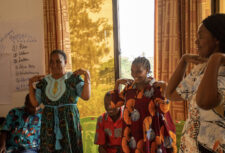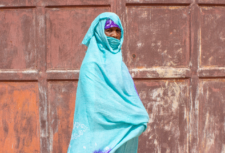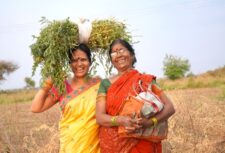Disclaimer: This article is more than 12 years old, and may not include the most up-to-date information or statistics. Please verify information with more recent sources as needed, and if you have any questions contact our Press Office.
21 April 2011
Help Anti-Slavery International abolish use of child slavery in Ivory Coast
London, Thursday 21 April 2011 – This Easter Anti-Slavery International is launching choco-coat to raise awareness of child slavery in Ivory Coast’s cocoa production. Ivory Coast is the world’s largest producer of cocoa and a new report by Anti-Slavery International has found that children, some as young as nine years old, are being trafficked from neighbouring countries and forced to work on cocoa farms. The report also calls for cocoa traders – who act as brokers between farmers and the brands who buy from them – to do much more to prevent the use of child slavery in their supply chain.
Anti-Slavery International wants to put these typically anonymous traders in the spotlight, and apply pressure to them, and the brands and manufacturers they liaise with daily, to eliminate child slavery in cocoa production. Anti-Slavery International is calling on all individuals and companies profiting from the Ivory Coast’s cocoa trade to invest at least 0.7 per cent of pre-tax profits to ensure that their operations are free from child slavery.
What is choco-coat?
Cocoa traders say that they work to eliminate the worst forms of child labour and forced labour but this ‘choco-coat’ corporate messaging obscures the reality that cocoa traders are doing the least to prevent child slavery in the Ivorian cocoa sector.
To bring attention to the difference between the reality and official statements, Anti-Slavery International is calling on you to choco-coat the tweets you send to friends – covering them in a sugary sweetness that transforms the original message. Write the rudest, most controversial thing you can think of, hit ‘choco-coat this tweet’ and the tool will transform your tweet in to something lovely and send it to your intended recipient.
Upon receipt of the choco-coated tweets, your friends get the option to find out more about Anti-Slavery International’s campaign – as well as getting the chance to see the tweet that you actually wrote.
Anti-Slavery International hopes that creating an interesting, fun, topical tool for Easter will apply pressure on cocoa traders to take action. It aims to bring the traders out of the shadows and make them, and the brands and they trade with, accountable for child slavery in the Ivorian cocoa sector.
Anti-Slavery International’s Director, Dr Aidan McQuade, commented: “We want to spotlight the plight of the thousands of children forced to work to produce the raw ingredients of the Easter Eggs we’ll soon be enjoying at home. It is unacceptable for cocoa traders are not doing more to ensure that they are not buying cocoa harvested by children trafficked into slavery.
“choco-coat is a bit of fun, but it raises serious issues and, we hope, will spread the word and perhaps force the cocoa traders to take long-overdue action.”
choco-coat your tweets at www.choco-coat.com
Follow Anti-Slavery International on Twitter: @Anti_Slavery or Find us on Facebook
Find more information about Anti-Slavery at www.antislavery.org
Case studies
‘Amadou’ from Sikasso in Mali went to Ivory Coast aged 14 and worked on a cocoa farm for three years. “We all worked for three years without being paid. When we asked to be paid our boss always found excuses of why he couldn’t pay us at that time. He wanted us to stay another three years and he said that he would then pay us the six years all together. We didn’t want to stay so he sent us away. We were betrayed and I came back with empty hands.”
‘Abdoulaye’ from Letiefesso in Burkina Faso was nine years old when he was trafficked to Ivory Coast. “A man told me that if I went with him to work in Ivory Coast I could have a bicycle. We had to get up at four in the morning and work for 12 hours. At night it was difficult to sleep because of the pains in my body. My memory of being on the farm is only of suffering. I worked for several months but was only paid 13,000 CFA (£17.50), which was enough for my bus fare home but not enough for me to buy a bicycle.”





